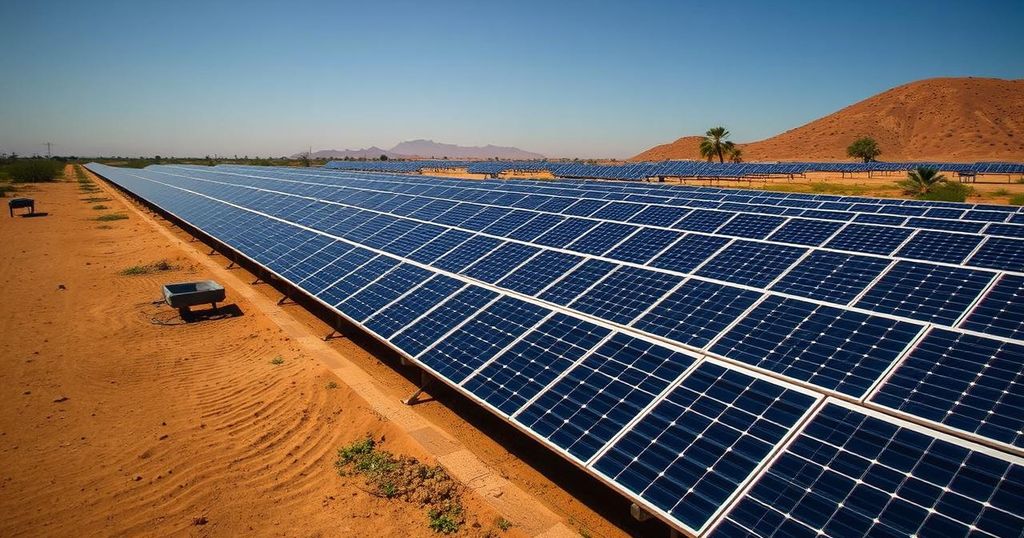Egypt Strengthens Ties with Djibouti through Solar Energy Project

Egypt has enhanced its relations with Djibouti through a new solar power project, aiming to provide alternative energy sources to the Horn of Africa nation and reduce dependence on Ethiopia. The initiative involves constructing a solar power farm with possible future expansion and includes training for Djiboutian technicians. This development highlights the shifting energy dynamics in the region as both countries seek to address economic and social needs while navigating complex geopolitical tensions.
The recent enhancement of relations between Egypt and Djibouti has culminated in a significant solar power initiative aimed at fostering energy independence for Djibouti while simultaneously reducing its reliance on Ethiopia, Egypt’s regional rival. This ambitious project entails the development of a solar power facility in the arid landscapes of Djibouti, with potential future expansion to a capacity of 300 kilowatts. Under the agreement, Egypt will finance the initiative and provide training for local technicians to ensure effective operation of the facility. The agreement was officially signed in a virtual meeting between Egypt’s Energy Minister, Mahmoud Essmat, and Djibouti’s Energy Minister, Yonis Ali Gued, who focused on mutual economic aspirations during their discussions, deliberately sidestepping any mention of the underlying regional tensions. The accord encompasses the installation of solar panels near Omar Jaggaa. Alexis Mohamed, an advisor to President Ismail Omar Guelleh, articulated the importance of this agreement, stating, “The signing on Tuesday of an agreement on the construction of a solar power plant with a capacity of 276.5 kilowatts between Djibouti and Egypt not only marks a step towards a mutually beneficial collaboration between our two countries, but also reaffirms the demands of President Ismail Omar Guelleh, who continues to make the energy issue a national priority in favour of our economic and social development.” Simultaneously, observers note that this burgeoning partnership between Djibouti and Egypt may bear significant ramifications for the broader Horn of Africa region. Historically, Egypt and Ethiopia have been engaged in disputes over Nile waters and security collaborations pertaining to Somalia, with Egypt forging alliances with nations that are often adversarial to Ethiopia. Ethiopia and Djibouti are deeply interconnected economically, as Ethiopia relies on Djibouti for 95% of its imports, and Djibouti sources over 60% of its domestic energy supply from Ethiopia. Despite Djibouti’s attempts to strengthen its ties with Ethiopia—such as inviting it to establish a new port on its territory following Ethiopia’s contention with Somalia over a maritime agreement—it is clear that Ethiopia appears to be favoring Somaliland in its pursuit of access to the sea and establishing naval facilities. Recently, Djibouti has also benefited from a newly completed 283-kilometer transmission line funded by the African Development Bank, delivering power from Dire Dawa, Ethiopia, effectively positioning Djibouti as one of Ethiopia’s most significant electricity clientele. Djibouti’s electricity consumption has surged due to increased maritime business at its port. As a result, the country forecasts a demand for approximately 1 gigawatt daily by 2030. Thus, the pursuit of solar and geothermal investments has become paramount in addressing these energy needs. According to World Bank data, approximately 65% of Djibouti’s population currently has access to electricity, with projections anticipating that this figure will rise to 72% following the implementation of new energy infrastructure, including the anticipated solar farm.
The geopolitical landscape of the Horn of Africa is characterized by complex inter-state relationships, particularly involving Egypt, Ethiopia, and Djibouti. The interplay between these nations is heavily influenced by water and energy security issues stemming from the Nile River dispute between Egypt and Ethiopia. Djibouti has historically served as a critical conduit for Ethiopian trade given its strategic location and has relied on Ethiopia for substantial energy needs. In response to national energy demands and the pursuit of renewable energy solutions, Djibouti is increasingly collaborating with various nations, particularly Egypt, to diversify its energy sources and bolster its economic development.
In conclusion, the recent solar project agreement between Egypt and Djibouti illustrates a strategic move by Egypt to forge stronger ties with Djibouti amid ongoing regional tensions with Ethiopia. This development not only promises to enhance Djibouti’s energy security and independence but also signifies a pivotal shift in the energy dynamics within the Horn of Africa. As both nations aim for economic growth through renewable energy investments, the repercussions of this partnership may reverberate throughout the region, influencing broader diplomatic and economic interactions.
Original Source: www.theeastafrican.co.ke








